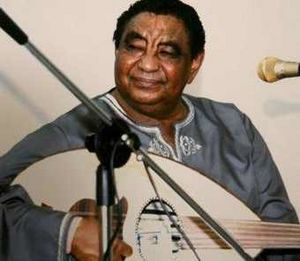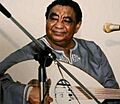Mohammed Wardi facts for kids
Quick facts for kids
Mohammed Wardi
محمد عثمان حسن وردي |
|
|---|---|
 |
|
| Background information | |
| Birth name | Mohammed Osman Hassan Salih Wardi |
| Born | 19 July 1932 |
| Origin | Sawarda, Wadi Halfa, Sudan |
| Died | 18 February 2012 (aged 79) Khartoum |
| Genres | Music of Sudan, Nobiin, Arabic music |
| Occupation(s) | singer-songwriter, teacher |
| Instruments | Singing, oud, tanbur, multiple instruments |
| Years active | 1957–2012 |
Mohammed Osman Hassan Salih Wardi (Arabic: محمد عثمان حسن وردي; born July 19, 1932 – died February 18, 2012) was a famous Nubian singer, poet, and songwriter from Sudan. Many people, like Sudanese writer Lemya Shammat, remember him as a huge inspiration in Sudanese music and culture. His amazing talent and contributions are still seen as unmatched in Sudan.
Contents
Mohammed Wardi: A Sudanese Music Legend
Early Life and Education
Mohammed Wardi was born on July 19, 1932, in a small village called Sawarda. This village is near Wadi Halfa in Northern Sudan. Sadly, his mother passed away when he was a baby. His father also died when Mohammed was only nine years old. He grew up in a place rich with different cultures. This helped him become very interested in poetry, books, music, and singing from a young age. To finish his schooling, he moved to Shendi in Central Sudan. After that, he returned to Wadi Halfa to work as a secondary school teacher.
Becoming a Star
In 1953, Wardi visited Khartoum for the first time. He went there as a teacher to attend a special meeting. After this trip, he decided to move to Khartoum and start his career as a musician. In 1957, a big radio station called Omdurman Radio chose him to record and sing his songs. This was a huge step, as he joined other famous singers of that time. In his first year, Wardi recorded 17 songs! He also worked closely with a poet named Ismail Hassan. Together, they created more than 23 songs.
His Music and Messages
Mohammed Wardi was known for using different musical instruments. One special instrument he played was the Nubian kissar. He sang in both Arabic and Nubian languages. People often called him one of "Africa's top singers." His fans were mostly in the area known as the Horn of Africa. His songs covered many topics. He sang about love, passion, and the rich traditions of Nubian people. He also sang about his country's history and pride. Some of his songs were about important political ideas. These songs sometimes led to challenges with the government. After a change in government in 1989, he had to leave Sudan. He lived in places like Cairo and Los Angeles for a while. In 1990, Wardi performed a concert for 250,000 Sudanese people. They were living in a refugee camp in Itang, Ethiopia. He finally returned to Sudan in May 2002. In 2005, the University of Khartoum gave him a special award called an honorary doctorate.
Later Years and Legacy
Later in his life, Mohammed Wardi faced health problems. He suffered from kidney failure. In 2002, one of his fans generously donated a kidney to him, and he received a kidney transplant. Mohammed Wardi passed away on February 18, 2012. He was buried in the Farouk Cemetery in Khartoum. His music and powerful messages continue to inspire many people in Sudan and beyond.
Images for kids
 | Laphonza Butler |
 | Daisy Bates |
 | Elizabeth Piper Ensley |


